- NEW: At least 30 people are found on the mountain in a state of "cardiac arrest," police say
- Rescue workers are searching for hikers who are trapped or missing, authorities say
- Mount Ontake began erupting Saturday, unleashing a cloud of ash that engulfed hikers
- More than 25 people were reported to have been injured in the eruption
Gifu, Japan (CNN) -- Police said Sunday that at least 30 people have been discovered in a state of "cardiac arrest" on a Japanese volcano that started erupting a day earlier.
The description of the people's condition means they were found without a pulse and weren't breathing but hadn't yet been declared dead by a doctor.
Rescue teams had begun searching Sunday for dozens of climbers who were caught by the sudden eruption of Mount Ontake.
The volcano in central Japan unleashed a huge cloud of ash late Saturday morning that billowed down the mountainside and engulfed hikers in its path.
The exact number of people unaccounted for was unclear, as officials were uncertain how many had already made it off the mountain. Authorities estimated there were 200 to 250 hikers in the area at the time of the eruption.
Some people remained trapped in several cottages on the mountain, and others were missing altogether, local authorities said.
Dense fumes are spewed out from several spots on the slope of Mt. Ontake as the volcano erupts in central Japan Saturday, Sept. 27, 2014.
More than 350 rescue workers -- a mix of police, firefighters and military personnel -- began climbing two separate routes up the mountain on Sunday morning, authorities in the nearby village of Otaki said.
 Plumes of smoke and ash rise as over Mount Ontake in central Japan on Saturday, September 27.
Plumes of smoke and ash rise as over Mount Ontake in central Japan on Saturday, September 27.  An aerial view shows the dense white plume of Mount Ontake rising high into the sky.
An aerial view shows the dense white plume of Mount Ontake rising high into the sky.  Witnesses described a sound like thunder during the eruption, the first at Mount Ontake since 2007.
Witnesses described a sound like thunder during the eruption, the first at Mount Ontake since 2007.  Dense fumes are spewed out from several spots on the slope of Mount Ontake.
Dense fumes are spewed out from several spots on the slope of Mount Ontake.  The eruption caught several hikers by surprise. Local authorities say there were roughly 150 hikers in the area at the time.
The eruption caught several hikers by surprise. Local authorities say there were roughly 150 hikers in the area at the time.  Climbers descend Ontake as the mountain erupts.
Climbers descend Ontake as the mountain erupts.  Climbers flee the mountain as the eruption coats the area in a layer of ash.
Climbers flee the mountain as the eruption coats the area in a layer of ash.  A mountain lodge is covered in ash by the eruption.
A mountain lodge is covered in ash by the eruption.  Smoke and ash rise from the summit crater of Mount Ontake.
Smoke and ash rise from the summit crater of Mount Ontake. Japan's Mount Ontake erupts
Japan's Mount Ontake erupts
Japan's Mount Ontake erupts
Japan's Mount Ontake erupts
Japan's Mount Ontake erupts
Japan's Mount Ontake erupts
Japan's Mount Ontake erupts
Japan's Mount Ontake erupts
Japan's Mount Ontake erupts
 Mount Ontake erupts
Mount Ontake erupts Alert level raised

 Dense white plumes rise high in the air as Mount Ontake erupts in central Japan on Saturday, September 27.
Dense white plumes rise high in the air as Mount Ontake erupts in central Japan on Saturday, September 27. 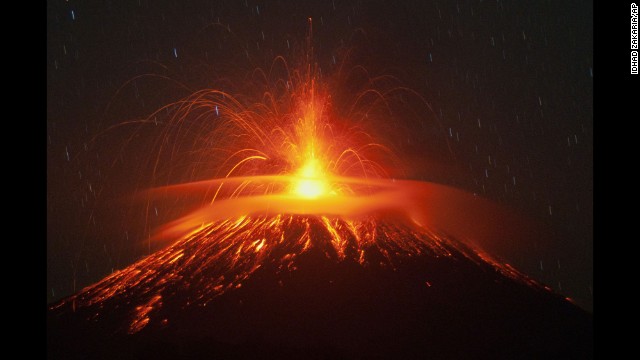 Mount Slamet spews lava and gas during an eruption in Brebes, Indonesia, on Thursday, September 18.
Mount Slamet spews lava and gas during an eruption in Brebes, Indonesia, on Thursday, September 18.  Fountains of lava spurt from a fissure in the ground on the north side of the Bardarbunga volcano in Iceland on Tuesday, September 2.
Fountains of lava spurt from a fissure in the ground on the north side of the Bardarbunga volcano in Iceland on Tuesday, September 2.  Fluid lava streams on Monday, September 1, from a flow that began erupting in June from the Kilauea volcano in Pahoa, Hawaii.
Fluid lava streams on Monday, September 1, from a flow that began erupting in June from the Kilauea volcano in Pahoa, Hawaii. 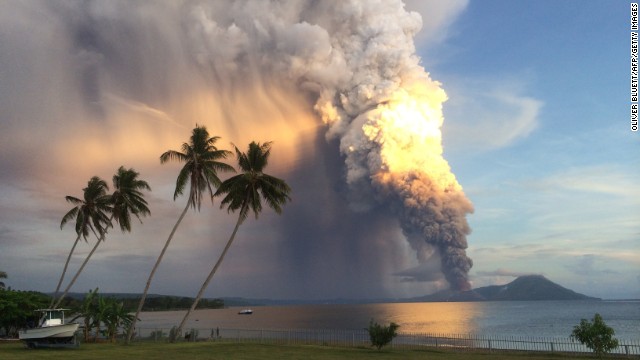 Mount Tavurvur erupts Friday, August 29, in eastern Papua New Guinea, forcing local communities to evacuate and international flights to be rerouted.
Mount Tavurvur erupts Friday, August 29, in eastern Papua New Guinea, forcing local communities to evacuate and international flights to be rerouted.  The Tungurahua volcano, as seen from Ambato, Ecuador, spews a column of ash on April 4. The volcano emitted a 6-mile-high column of ash after a powerful, five-minute explosion that shot pyroclastic material onto its northern and northwestern flanks. The volcano has been active since 1999, with several major eruptions in that span.
The Tungurahua volcano, as seen from Ambato, Ecuador, spews a column of ash on April 4. The volcano emitted a 6-mile-high column of ash after a powerful, five-minute explosion that shot pyroclastic material onto its northern and northwestern flanks. The volcano has been active since 1999, with several major eruptions in that span.  A villager in Karo, Indonesia, bathes in a river while Mount Sinabung erupts, spewing lava and giant clouds of ash on January 21.
A villager in Karo, Indonesia, bathes in a river while Mount Sinabung erupts, spewing lava and giant clouds of ash on January 21. 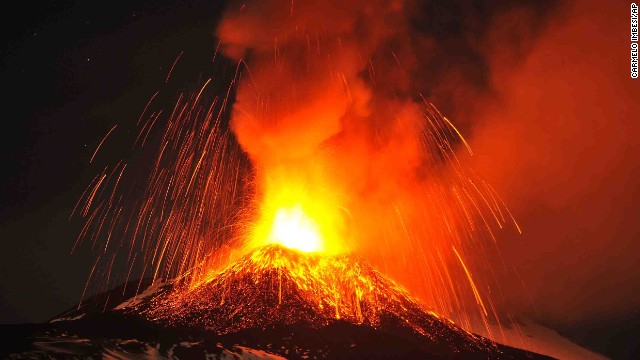 Mount Etna, as seen from the town of Acireale, Italy, spews lava during an eruption on November 16, 2013.
Mount Etna, as seen from the town of Acireale, Italy, spews lava during an eruption on November 16, 2013. 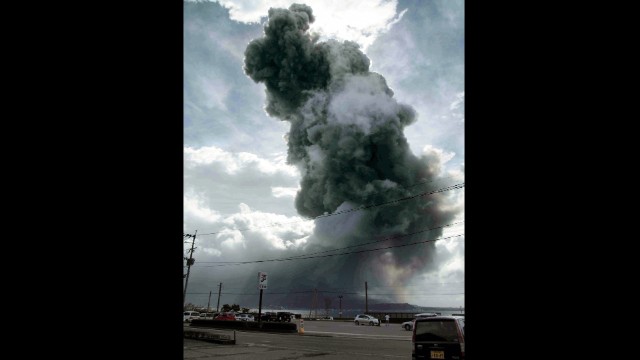 Smoke and ash spew from Mount Sakurajima, in Kagoshima, Japan, on October 7. 2013
Smoke and ash spew from Mount Sakurajima, in Kagoshima, Japan, on October 7. 2013  Lava from the Puu Oo cone of the Kilauea volcano reaches the Pacific Ocean on the southeastern coast of Hawaii Island in January 2013. Puu Oo has been erupting for more than 30 years. This eruption, on the volcano's east rift, began in January 1983.
Lava from the Puu Oo cone of the Kilauea volcano reaches the Pacific Ocean on the southeastern coast of Hawaii Island in January 2013. Puu Oo has been erupting for more than 30 years. This eruption, on the volcano's east rift, began in January 1983.  The Karymsky volcano erupts in Kamchatka, Russia, in January 2013.
The Karymsky volcano erupts in Kamchatka, Russia, in January 2013.  The Copahue volcano emits smoke and ash above Caviahue, in Argentina's Neuquen province, in December 2012.
The Copahue volcano emits smoke and ash above Caviahue, in Argentina's Neuquen province, in December 2012. 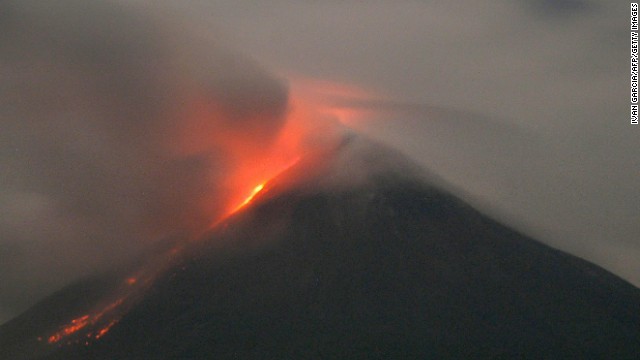 Western Mexico's Colima volcano emits lava in October 2004. The Global Volcanism Program reported "a bright thermal anomaly" as well as gas emission in November 2013.
Western Mexico's Colima volcano emits lava in October 2004. The Global Volcanism Program reported "a bright thermal anomaly" as well as gas emission in November 2013. Recently active volcanoes
Recently active volcanoes
Recently active volcanoes
Recently active volcanoes
Recently active volcanoes
Recently active volcanoes
Recently active volcanoes
Recently active volcanoes
Recently active volcanoes
Recently active volcanoes
Recently active volcanoes
Recently active volcanoes
Recently active volcanoes
 Photos: Recently active volcanoes
Photos: Recently active volcanoes More than 25 people were reported to have been injured, 10 of them seriously, according to the government of Nagano prefecture, where the volcano is situated. Among the climbers trapped in the cottages, at least 11 were injured, officials in Otaki said.
They said they had observed 17-20 inches (40-50 centimeters) of volcanic ash covering the ground in some areas.
The Japan Meteorological Agency has raised the Volcanic Alert Level for Ontake from 1 to 3. That means the public is advised to not approach the volcano, the summit of which is at an altitude of 3,067 meters (10,060 feet).
About 250 people living near the mountain have decided to remain in their homes, police said.
The last major eruption of Mount Ontake, which is about 200 kilometers (125 miles) west of Tokyo, took place in 1979, according to the Global Volcanism Program at the Smithsonian Institute.
Smaller scale activity was reported in 1984, 1991 and 2007.
CNN's Will Ripley reported from Gifu, Japan, and Jethro Mullen reported and wrote from Hong Kong. CNN's Junko Ogura contributed to this report.

0 comments:
Post a Comment